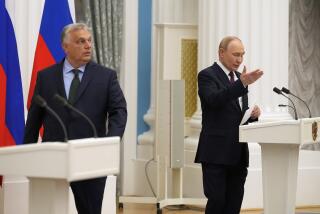TRANSITION / SEARCH FOR A LANGUAGE : In Hungary, Learning Russian Is Out of Style : English is ‘suddenly very fashionable, but there is a big shortage of teachers.’
- Share via
BUDAPEST, Hungary — When the minister of education announced last fall that the teaching of Russian was no longer compulsory in Hungarian schools, students celebrated by shredding their Russian textbooks.
“Russian was forced on us,” student Krisztina Karoly, 20, told a reporter recently. “It will always be considered the language of oppression.”
She said that English is “suddenly very fashionable, but there is a big shortage of teachers.”
Eastern Europeans have halted the teaching of Russian in keeping with their declarations of independence after four decades of political and cultural domination. But a linguistic vacuum has been created in the Soviets’ wake. From Budapest to the Baltic Sea, the newly liberated millions are finding that they lack the voice to negotiate new alliances with the West.
Tens of thousands of Russian-language teachers have been made redundant, compounding the emerging threat of unemployment and posing a challenge to Western democracies to help the East in its cultural--as well as ideological--transition.
In Hungary, where the demand for language instruction is said to be greatest, small armies of American, British and German language teachers have jumped into the void seeking to make their mother tongue the language of reform.
Young Hungarians appear to favor English, a language they have come to know through popular music, films and cable television. But a thirst for lucrative business ties with economically powerful West Germany has strengthened a historic bent for German, which is spoken along the border with Austria.
In Poland, traditional ties with the United States and its lingering aversion to German influence have established English as its uncontested medium for foreign contact.
And in Czechoslovakia, its long border with German-speaking nations argues for that language. But the Czechoslovak ambassador to the United States, Rita Klimova, has appealed to Washington for help in preventing her country from being “Germanized” by hasty compacts with its prosperous neighbor.
Dropping Russian left “gaping holes in our curricula, and the question is, will they be filled by German or English?” Klimova said recently.
Gregory Orr, a Budapest-based diplomat with the U.S. Information Service who is coordinating language exchanges for Eastern Europe, said: “Throughout the whole region, the turn away from the East and toward the West is most substantively manifested by the turning away from Russian and toward English. Russian teachers were practically ejected by force from the classroom.”
Hungary alone has 8,000 Russian teachers in need of retraining, and the notoriously low pay offered public school teachers is making the crisis worse by driving skilled teachers into the booming commercial market.
English- and German-speakers are in high demand as translators and tutors.
The resulting public-school language gap will take years to overcome, but some Western nations have responded with new aid.
The American Peace Corps recently signed an agreement with the Hungarian government to deploy 60 teachers of English in Hungary this summer.
The New York-based Soros Foundation, bankrolled by Hungarian emigre George Soros, has sponsored nearly 500 Hungarian teachers to learn English in the United States.
But Eastern Europeans are concerned that U.S. involvement may be short-lived.
“Hungarians worry that the United States will tire of them,” Orr observed. “This is the year of Eastern Europe. But next year could be the year of Central America or some other region that captures the moment.”
More to Read
Sign up for Essential California
The most important California stories and recommendations in your inbox every morning.
You may occasionally receive promotional content from the Los Angeles Times.














